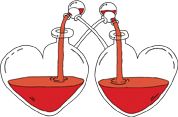Heart to Heart

“I was thinking about getting my husband a case of red wine for Valentine’s Day as a way of telling him “I love you” but also as a way to keep his heart (and mine if he shares) healthy. My question is: Does the latest research still suggest that red wine really is good for your heart?” - Janice (McMinnville)
First of all, your husband is a lucky guy. A case of red wine is always a welcome gift for almost anyone, and I love your idea about making it for his heart. As it turns out, February is also Heart Health Awareness Month, so thank you for bringing this up at such an opportune time. The quick answer to your question is that there really is no quick answer. Red wine has been proven effective against heart disease, but there are some downsides and caveats to consider.
Scientists believe that antioxidants called flavonoids reduce the risk of coronary heart disease by bolstering “good” HDL cholesterol, lowering production of “bad” LDL cholesterol and by reducing blood clotting. Researchers at the University of California Davis tested a variety of wines to determine which types have the highest concentrations of these antioxidants, and their results found that Cabernet Sauvignon, Petit Syrah and Pinot Noir — yes! — were the top three.
Recently, researchers have found that drinking a glass of red wine while eating dark or red meat can counteract the buildup of cholesterol following a meal often caused by these rich foods. Another antioxidant found in red grapes called polyphenols blocked these compounds from making their way into the bloodstream where they can cause damage. Some scientists believe that this may help to explain why red wine has frequently been associated with reducing the risk of heart disease.
The suggested amount of red wine to maximize health benefits is one four-ounce glass a day for women and one to two glasses for men. This general guideline is limited to individuals not already suffering health problems. Diseases like pancreatitis, liver disease, uncontrolled hypertension, depression and congestive heart failure may be worsened by even moderate alcohol consumption.
And for those without health issues, moderation is the key to reaping the greatest health benefits from red wine. Excessive alcohol consumption has shown to cause damage to nerve cells, the liver and pancreas and increased blood pressure.
Other recent studies have shown that non-alcoholic red grape juice can also reduce blood pressure because the same polyphenols present in Cabernet and Pinot Noir are also found in unfermented versions. Good news for the non-drinker.
Also good news — OK, GREAT news! — is daily dark chocolate consumption has been proven to help lower blood pressure as well. Now, I’m no doctor — I can’t stand the sight of blood — but my guess is that a little dark chocolate, a glass of, say, Pinot Noir and an evening with friends and laughter, which is also shown to reduce the likelihood of heart disease, would make a great Valentine’s gift for both of you. Just make sure he shares.
Cheers, Jenni Cossey
Email me at jcossey@oregonwinepress.com to submit your questions, and I’ll see you next month!







